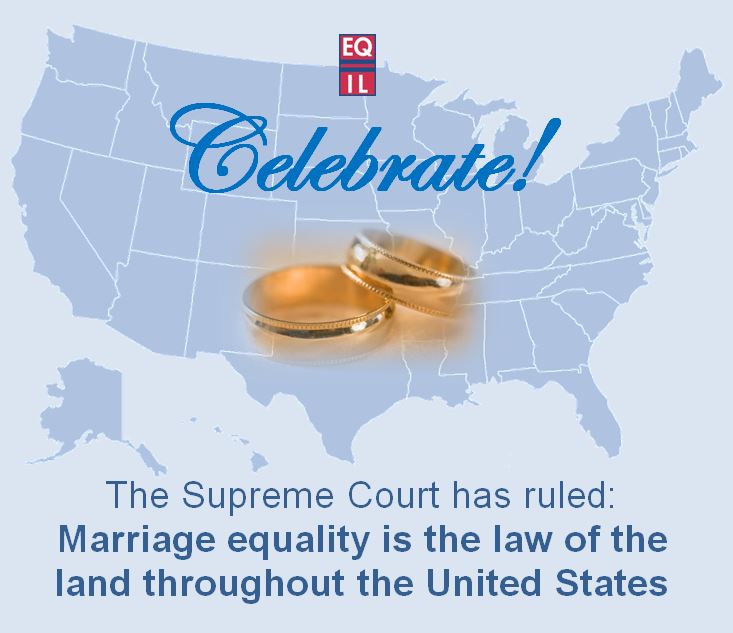The Supreme Court Decision on Marriage Equality
OBERGEFELL V. HODGES: QUESTIONS AND ANSWERS

On June 26, 2015, the United States Supreme Court released its opinion in Obergefell v. Hodges, a case which questioned the constitutionality of state bans on recognizing same-sex marriages performed in other states. This Questions and Answers guide will help explain what the case was about, what the Supreme Court decided, and most importantly, what these decisions mean for same-sex couples in Illinois.
What was this case about?
James Obergefell’s partner of twenty-one years, John Arthur James, was terminally ill with ALS when the Supreme Court struck down the Defense of Marriage Act in 2013. The couple wanted to be married before John died, but their home state of Ohio did not perform same-sex marriages. On July 11, 2013, the couple flew to the nearest state with marriage equality, Maryland, exchanged vows on the tarmac of the airport, and returned home.
John wanted James to be named as his surviving spouse on his death certificate. Ohio, however, does not recognize same-sex marriages performed legally in other states. The couple filed a federal lawsuit against Ohio, arguing that the state’s ban on same-sex marriage violates the Equal Protection Clause and the Due Process Clause of the U.S. Constitution. On July 22, 2013, the U.S. District Court for the Southern District of Ohio granted the couple a temporary restraining order that required the state recognize their marriage on John’s death certificate. John died on October 22, 2013 before full court proceedings began.
On December 22, 2013, after two other couples joined the lawsuit, the District Court ruled that Ohio’s refusal to recognize same-sex marriages performed in other states was discriminatory and ordered Ohio to recognize them as they would any marriage performed in another state. The state appealed the decision to the Sixth Circuit Court of Appeals, which disagreed with the District Court, ruling that Ohio’s ban does not violate the Constitution because Ohio has the authority to define marriage in a way that conflicts with other states, and forcing Ohio to recognize same-sex marriages performed in other states would violate that authority.
The couples appealed the decision to the Supreme Court, which heard arguments on April 28, 2015.
What did the Supreme Court decide?
The Supreme Court decided that the U.S. Constitution requires all states to perform same-sex marriages. Additionally, all states are required to recognize same-sex marriages, regardless of where performed.
What does this mean?
Marriage equality is nationwide! All states are required to afford same-sex couples the same rights and benefits of marriage as heterosexual couples. Furthermore, all states must recognize same-sex marriages lawfully performed in other states.
Are same-sex marriages legal in Illinois?
Yes. Illinois legalized same sex marriage in 2013 and the law has been in effect since 2014.
I have a civil union in Illinois. Does this decision change anything?
No. The decision only concerns marriages.
My partner and I were married in another state that allows same-sex marriage. What does this mean for us?
Your out-of-state marriage will not only be recognized in Illinois, but in every state!
Does this decision also apply to U.S. Territories?
The Fourteenth Amendment to the Constitution, which is the basis for this decision, applies to U.S. Territories as well as to the States. Therefore, U.S. Territories such as Puerto Rico, the U.S. Virgin Islands, and Guam, will now legally recognize same-sex marriages performed in Illinois. Likewise, same-sex couples can get married in a U.S. Territory and their marriage will be recognized in their home state.
What does this mean for the future?
For the time being, the marriage equality issue is settled, and same-sex couples have all the same marriage rights, benefits and responsibilities as heterosexual couples. All states will be required to recognize same-sex marriages performed in other states.
How do we get married in Illinois or learn more about our marriage rights?
Please click to see Equality Illinois’ Marriage Planning Guide.
We are grateful to the law firm of Foley & Lardner LLP for their assistance with this project. This summary is intended only as a general description of the Supreme Court decision in Obergefell v. Hodges. It is not intended as legal advice.
